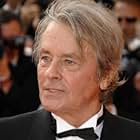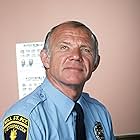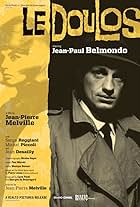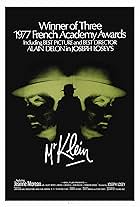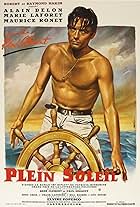After a shaky first heist, a group of thieves plan an even more elaborate and risky second heist.After a shaky first heist, a group of thieves plan an even more elaborate and risky second heist.After a shaky first heist, a group of thieves plan an even more elaborate and risky second heist.
- Awards
- 1 nomination
- Director
- Writer
- All cast & crew
- Production, box office & more at IMDbPro
Alain Delon's Top 10 Films, Ranked
Alain Delon's Top 10 Films, Ranked
To celebrate the life and career of Alain Delon, the actor often credited with starring in some of the greatest European films of the 1960s and '70s, we rounded up his top 10 movies, ranked by IMDb fan ratings.
Storyline
Did you know
- TriviaWhen planning the train robbery they calculate a time frame of 20 minutes. When the robbery actually takes place, the sequence is exactly 20 minutes long.
- GoofsA tag is visible on Coleman's black tie when he exits the private room at the club with Cathy and Simon. The tag is not there when he enters the room.
- Quotes
Commissaire Edouard Coleman: The only feelings mankind has ever inspired in policemen are those of indifference and derision.
- ConnectionsFeatured in Sous le nom de Melville (2008)
- SoundtracksC'est ainsi que les Choses Arrivent
Music by Michel Colombier
Lyrics by Charles Aznavour
Performed by Isabelle Aubret
Featured review
Career criminals wear fedoras and trenchcoats like its 1945 and they're attending a Robert Mitchum impersonation competition. Rain isn't weather; it's sexytime music for a cocaine heist. The world is covered in an uncompromising azure mist that squeezes the life out of every possibility of beauty, whether that beauty is reaching Catherine Deneuve's white blonde demeanor or an enticingly French city street. A Jean-Pierre Melville directed crime film rests in a middle-ground of romanticization and adamant realism; it climaxes at the nearest sight of a Humphrey Bogart photograph, but it's also interested in telling a story where a robbery can be delivered with seamless perfection ... but that doesn't mean that a pessimistic cop won't catch up with you in the end in a hazardously bloody fashion.
Un Flic is a relatively minor Melville film (especially putting Bob le Flambeur and Le Cercle Rouge into consideration), but it's ravishing all the same. Like the problematic comprehensibility of The Big Sleep, it isn't worried about tight narrative. It's about temperament and atmosphere, and it's safe to say that the ambiance of Un Flic is penetrative enough to make your bones break. There's something uneasy that leaks from the ghost blue of the cinematography and Richard Crenna's depressed eyes; the placid slickness of it all can only reach so far before someone is shot.
Telling the interconnecting stories of a tireless cop (Alain Delon) and a nightclub owner (Crenna) who pulls off massively intricate jobs with big payoffs, Un Flic is squalid enough to make us squirm; criminals walk right under the noses of the police, while the police, as well-meaning as they are, are confined to a purgatory of law-breaking with payoffs that brings no one pleasure. In so many other crime films, there's a notion that once the main villains are locked up, the heroes are left satisfied, ready for their next big adventure. But Un Flic exists in an entirely different universe. The chasing and capturing of criminals is tiring, redundant even. Who is having more fun: the sinners, or the rule- followers?
Initially, the film seems as though it's going to transform into a full- fledged exercise in film noir style. Cigarettes are tossed around, liquor is spilled, and femme fatales are easy to come by. But the closer we get to the conclusion, we begin to realize something: Delon's character, Edouard Coleman, isn't a James Bond or a Frank Bullitt or a Harry Callahan. He is a man, a man who was intrigued by enforcing the law many moons ago but is finally growing restless from the unavoidable sleazy details he sees on a day to day basis. Behind his eyes is a glassy emptiness; if he were to throw away his badge this very moment, what difference would it make?
I suppose Un Flic's melancholy edge is what gives it such a lasting impression. The story is too complicated to easily follow and the style is one and the same with Melville's other films. But that blue, that blue, is disturbing. Unlike black-and-white, it gives reality a grit never seen by the naked eye. Crime doesn't pay and don't we know it, but in Un Flic, even renowned actors like Alain Delon and Catherine Deneuve can hardly live in a world this hopeless.
Un Flic is a relatively minor Melville film (especially putting Bob le Flambeur and Le Cercle Rouge into consideration), but it's ravishing all the same. Like the problematic comprehensibility of The Big Sleep, it isn't worried about tight narrative. It's about temperament and atmosphere, and it's safe to say that the ambiance of Un Flic is penetrative enough to make your bones break. There's something uneasy that leaks from the ghost blue of the cinematography and Richard Crenna's depressed eyes; the placid slickness of it all can only reach so far before someone is shot.
Telling the interconnecting stories of a tireless cop (Alain Delon) and a nightclub owner (Crenna) who pulls off massively intricate jobs with big payoffs, Un Flic is squalid enough to make us squirm; criminals walk right under the noses of the police, while the police, as well-meaning as they are, are confined to a purgatory of law-breaking with payoffs that brings no one pleasure. In so many other crime films, there's a notion that once the main villains are locked up, the heroes are left satisfied, ready for their next big adventure. But Un Flic exists in an entirely different universe. The chasing and capturing of criminals is tiring, redundant even. Who is having more fun: the sinners, or the rule- followers?
Initially, the film seems as though it's going to transform into a full- fledged exercise in film noir style. Cigarettes are tossed around, liquor is spilled, and femme fatales are easy to come by. But the closer we get to the conclusion, we begin to realize something: Delon's character, Edouard Coleman, isn't a James Bond or a Frank Bullitt or a Harry Callahan. He is a man, a man who was intrigued by enforcing the law many moons ago but is finally growing restless from the unavoidable sleazy details he sees on a day to day basis. Behind his eyes is a glassy emptiness; if he were to throw away his badge this very moment, what difference would it make?
I suppose Un Flic's melancholy edge is what gives it such a lasting impression. The story is too complicated to easily follow and the style is one and the same with Melville's other films. But that blue, that blue, is disturbing. Unlike black-and-white, it gives reality a grit never seen by the naked eye. Crime doesn't pay and don't we know it, but in Un Flic, even renowned actors like Alain Delon and Catherine Deneuve can hardly live in a world this hopeless.
- blakiepeterson
- May 1, 2015
- Permalink
- How long is A Cop?Powered by Alexa
Details
- Release date
- Countries of origin
- Language
- Also known as
- Dirty Money
- Filming locations
- Saint-Jean-de-Monts, Vendée, France(bank robbery at the beginning)
- Production companies
- See more company credits at IMDbPro
Box office
- Gross US & Canada
- $48,040
- Opening weekend US & Canada
- $10,342
- Apr 21, 2013
- Gross worldwide
- $48,437
Contribute to this page
Suggest an edit or add missing content










